I’m working on a book called Syren. It’s a Science Fiction novel. Here’s a look at the first chapter. Feel free to let me know what you think. Either in the comments or an email.
Sirch stared up into the darkness that was his room. Somewhere above him the roughhewn timbers of the house lurked. Most nights the house was completely dark. Sometimes, one of Syren’s two moons would provide just enough light to make out the simple features of his room. But, not tonight. Tonight the darkness was complete. It was for the best. Tomorrow, after the surgery, he’d be able to lie here in complete oblivion. The thought made him shiver and snuggle down further into the warm wool blankets. Spring was coming, but the nights were still chill enough that he appreciated the heavy blankets, especially after the fire had died down. Even though he couldn’t see it, he knew his skin was still almost completely red. It had been that way all day, It didn’t even revert to its natural blue when he took the time to try to eat.
Somewhere a half league or so out on the prairie an etoyoc, one of a series of small carnivores yapped out a challenge. Perhaps he was calling to a mate, or directing his pack in the hunt. It was a sound easily dismissed. But, not tonight. Tonight Sirch, hung on every sound.
Sounds. He’d always taken them for granted. At 13 he was old to still be seeing with his ears. That’s what the kids called it. Babies and toddlers could close their eyes and still see those around them by using their ears. Neb, his best friend for as long as he could remember had been the first of them to lose his ability to see with his ears. They were eleven at the time.
“Sirch,” Neb signed to him one day during a break from classes. “Guess what?”
“You’re ugly?” Sirch made the sign by drawing his crooked finger across his upper lip. Neb ignored the jab and continued excitedly. “Watch this!” And with that Neb closed his eyes and leaned his head slightly back. “Go ahead. Move around and clap your hands.”
Sirch felt his stomach tighten up. It wasn’t fair. He was older than Neb. Sure, it was only by a month, but that still counted. Stepping behind Neb, and being careful not to touch him, Sirch loudly clapped his hands next to Neb’s left ear. Neb’s expression didn’t change. Sirch tried the right ear, harder this time. The crack of his hands caused some of the younger kids playing nearby in the dirt, to turn their heads. But, Neb continued his silent stance.
After a few moments that lasted an eternity for Sirch, Neb opened his eyes and quickly looked around for his friend. “Did you do it? Did you?” Neb’s questioning finger wagged like a dog. “See?” he signed. I didn’t see a thing. “Told you!”
“I didn’t do it,” Sirch weakly responded. “I just pretended to hit my hands.” It was clear that Neb didn’t believe him.
“Liar!” he signed laughing. Suddenly Sirch wanted to be anywhere but in the middle of the school yard. He could feel the tears welling up in his eyes. It was stupid for young men to cry. But, that’s right. He wasn’t really a man, young or otherwise. Not while he could still see with his ears. He was still one of the babies, unable to get a job, vote in village elections, or do any of the other things that men could do. The fact that at 11 Neb wouldn’t be allowed to do any of those things either didn’t seem to matter. Neb had changed.
His friend finally noticed that Sirch was not sharing the enthusiasm for his pending adulthood. “It’s okay Sirch. You’re older than me. I’m sure you’ll stop seeing with your ears any day now.” His friend was trying to help him save face. That made him feel even worse.
Before he could think of a response, the teacher waved the red flag on the porch signaling it was time to come back to class.
That was over two years ago. And during those two years, the rest of his friends and classmates each lost the ability to see with their ears. Everyone except Sirch. It was unheard of for anyone to finish their twelfth year and still be able to see with their ears. After the constant teasing, Neb learned to quit bringing it up. But, the shame was still almost more than Sirch could bear.
So, when his mother took him to the doctor today, he almost didn’t believe his eyes.
“Sirch, this is Dr Notrom. He’s going to prevent you from seeing with your ears.” Sirch turned in confusion from his mother to the doctor. It didn’t seem possible. Money was scarce and he could only remember going to see the doctor one other time. It was three years earlier, in the fall and he’d been very sick. The doctor had given him a red mixture that tasted like burnt berries when he swallowed it.
“I don’t understand. How can he do that? Will it be like the red mixture?” It was the doctor who responded, “No. We’ll need to operate.” Sirch didn’t understand the sign the doctor used. “We’ll need to make a small cut here.” The doctor indicated a point slightly behind his ear. “After that, your ears will be a good as anyone’s.”
He must have still looked uncertain. The doctor nodded at his mother who pulled back her long brown hair to reveal a small scar behind her right ear. “It’s the same way I became an adult when I was young.”
Sirch touched the tip of his finger and brought it around in a circle to ask, “When?”
“Tomorrow,” and with that the doctor stood indicating the appointment was over.
Sirch didn’t know what to think. He’d never heard of anyone who had. . .what was it the doctor had called it? An operation to make them normal. After years of ridicule, it hardly seemed possible that Sirch was finally going to be normal. No more jumping at loud noises. No more waking to sounds. And most importantly he’d finally be considered a man. Sure, a young man, but at least he’d be like everyone else. A wellspring of relief started at his toes and bubbled up through his body and finally erupting in his hands. He signed explosions, escaping birds, running, jumping, laughing. His skin, a normal pale blue was a swirling mix of reds, blues, purples and yellows.
Sirch’s mother didn’t say anything as they walked home. When, Sirch attempted to get her attention, she simply looked away so she couldn’t see what he was signing. He couldn’t be sure, but it almost seemed like she was sad. He couldn’t for the life of him imagine why.
He had been too excited to sleep. Even with all the lights out, he found he couldn’t close his eyes. Staring into the darkness he considered the many ways that tomorrow would change him. Nothing would ever be the same. A single steckirc chirped outside his window. Its lonely chirp every few seconds went unanswered. Sirch closed his eyes and watched the steckirc with his ears. How many things competed for his attention when he closed his eyes.
It was many hours into the night. Despite his excitement, Sirch must have slept. The darkness was still complete and total. His ears told him that his mother was stirring in the next room. To think that tomorrow he would no longer be able to see that. Tomorrow. . .no more likely today since he guessed it was well past midnight.
His door opened nearly silently on its leather hinges. His mother’s bare feet whispered across the floor toward his bed. He wondered why she didn’t put on a light so they could talk. He felt her hand in his. Every child learns the palm-spelling game. He loosely held his mother’s hand as she spelled out, “Y-O-U M-U-S-T G-O.” Then a pause. “N-O-W.”
Stay safe
Rodney M Bliss is an author, columnist and IT Consultant. His blog updates every weekday. He lives in Pleasant Grove, UT with his lovely wife, thirteen children and grandchildren.
Follow him on
Twitter (@rodneymbliss)
Facebook (www.facebook.com/rbliss)
LinkedIn (www.LinkedIn.com/in/rbliss)
or email him at rbliss at msn dot com(c) 2021 Rodney M Bliss, all rights reserved
A restaurant advertises that they “Serve anything you can think of.”
A man decides to test them. He walks in and says, “I’d like an elephant ear sandwich.
Sorry, we can’t help you.
I knew you didn’t have any elephant ears.
That’s not the problem
. . .
Opening call centers follows a pretty standard schedule. A good project manager can off the top of her head rattle off the key milestones and deliverables.
- Circuits
- PBX
- Networks
- Furniture
- PCs
And if you are a member of a project team, you probably know exactly what needs to happen before your piece and who is waiting behind you. For example, you cannot put the computers on desks until the desks get built. The desks cannot be built until the wiring is in place. The wiring is dependent on data center being built out. Phones cannot be setup until the PBX (Phone server) is in place.
All the while, HR and recruiting are hiring agents. The timing of the first construction is typically tied to the first day of training. We built our the training rooms first. Training was typically a month or so. We had to have the production floor ready by the time training was finished.
And then came the pandemic. Like everything else, it changed how we build as well. Now we are doing our training virtually. And the production is done by agents working from home.
In some ways, this was great for our project team. No longer were we constantly being driven to the schedule of training and construction. In fact, with our new site in Boulder, CO we started right off with training before we even knew our construction schedule. And a delayed construction schedule meant we got to keep our budget. We didn’t have to go out and buy a bunch of equipment before we got our agents on the phones.
Win-win, right?
Almost. There is one piece of the final production that needs to happen before agents can take calls.
Computers
You cannot take calls if you don’t have a computer to work on. In previous projects computers, PCs, were always the last piece put in place. Now, they are the first. Naturally we were concerned with making sure we had enough PCs to get us through the first few classes. At that point our budget would be approved and we could buy more PCs.
My job as the IT guy was to make sure we didn’t run out of computers. It was something I worked on and thought about every week. So, it was not a surprise when one of my engineers brought up the fact that we were projected to fall behind in the coming weeks.
So, we are running short on computers?
Well, not exactly.
What do you mean?
Well, we’ve got plenty of computers.
Well, then what’s the issue?
We’re running short on monitors.
That was not what I had been asking. Wrong question.
The guy in the sandwich shop asked,
If you’ve got the elephant ears, what’s the problem?
Well, we ran out of those big buns we serve them on.
Stay safe
Rodney M Bliss is an author, columnist and IT Consultant. His blog updates every weekday. He lives in Pleasant Grove, UT with his lovely wife, thirteen children and grandchildren.
Follow him on
Twitter (@rodneymbliss)
Facebook (www.facebook.com/rbliss)
LinkedIn (www.LinkedIn.com/in/rbliss)
or email him at rbliss at msn dot com(c) 2021 Rodney M Bliss, all rights reserved

Goalposts are not as stable as you may have been led to believe.
In the middle of the lines forming the ends of the field, the goal-posts are erected, and should be 18 feet 6 inches apart, with a crossbar 10 feet from the ground. The posts should project several feet above the cross-bar.
– 1892 Football rulebook
The NFL started in 1920 and used the above rule for the goalposts. Then, in 1927, the NCAA moved the goalposts off the goal-line and had them installed on the line at the back of the end zone. Naturally field goals became harder. The NFL followed the NCAA rules.
You might wonder why the pro football was following college rules? That’s because for most of the twentieth century college football was king. In fact, the reason pro football is on Sunday is because in the early days of the league, they didn’t think they could, or wanted to compete with college football which ruled Saturdays.
In 1933 the pro football league got around to writing their own rule book. They moved the goalposts back to the end zone line. It certainly helped scoring increase and cut down on ties.
In 1966 the NFL moved the goalposts again. The moved the posts off the goal line and stated they should be 20 feet tall. The following year, 1967 they moved them again. This is when they introduced the “slingshot” style of posts. That cut the number of posts players cut potentially run into in half.
The next change in goalposts was in 1974, this time they pushed them back to the endline again. This made field goals harder, (Ten yards harder, actually) because touchdowns are more exciting than field goals.
In 2014 the NFL extended the height of goalposts from 30 feet (10 feet below the bar and 20 feet above) to 35 feet. Below is still 10 feet.
In 2015 the league shrunk the distance between the goalposts stanchions from 18.5 feet apart which it had been for about 100 years to 14 feet wide. The experiment didn’t last long and they are now back at the “traditional” width of 18 feet 6 inches.
One of the things they teach you in Project Manager school (PMP) is a problem called “Scope Creep.” Scope creep happens when you start with a well defined project and stuff keeps getting added. It typically results in blowing your schedule, your budget or both.
Movies are famous for it. I’m not involved in the movie business, but some of my friends are. Movie budgets measured in the hundreds of millions of dollars can spin out of control. It puts them in a position where a movie could be a huge hit, but not be able to recoup it’s original cost.
We have a few employees in India that are assigned to my client. The rest of our employees assigned to my client are all in the United States, in big, strong, call centers. My client’s data is completely segregated from any other of my company’s client data. That’s easy when we build an entire call center around our one client.
But, in India I only had a couple of people. Originally, we just configured their computers to be secure.
Hey, could you guys move your agents so they are sitting with their backs to wall so no one else can see their screens?
Sure, that’s not hard, right? Just move them around.
Could you guys put your agents into like an office that is just for them?
Yeah, that’s not terrible difficult.
It needs to have a card reader on the door.
Okay,
And, of course we need cameras inside the room and covering the door.
Of course.
And we noticed that the data stream for these agents flows through the same data closet as the other people in the office. We need you to segregate that traffic.
Okay. . .
And it needs to be in a locked cage, that has a key and a log of anyone that access it.
Scope creep. I wasn’t the project manager for the entire project, but I took it over part way through.
I was thinking a lot about those moving goalposts. We did what the client asked, of course. They are the ones paying the bills, after all.
But, knowing that the NFL has been moving goalposts for the past 100 years makes me feel a little better about putting up with it for the past 14 months.

Stay safe
Rodney M Bliss is an author, columnist and IT Consultant. His blog updates every weekday. He lives in Pleasant Grove, UT with his lovely wife, thirteen children and grandchildren.
Follow him on
Twitter (@rodneymbliss)
Facebook (www.facebook.com/rbliss)
LinkedIn (www.LinkedIn.com/in/rbliss)
or email him at rbliss at msn dot com(c) 2021 Rodney M Bliss, all rights reserved
They change the password every couple of weeks. But, I know where they write it down.
– David Lightman
I’m a security guy. Part of job, a big part of my job is keeping my client’s data safe. We plan multiple layers of security. We have lots of physical security. We have card readers and man traps and big intimidating black turnstiles.
In addition we have computer security. The agents’ computers are pretty locked down. We have hardware security, we have software security; anti-virus, anti-phishing, anti-hacking, port security, disabled ports, restricted IP ranges, whitelists, blacklists.
And, of course, our agents have to have strong passwords. They log in at least three times with multiple passwords and at least one of the logins uses multi-factor authentication.
It literally is a secure as we can make it.
The entire system breakdowns if someone gets an agent’s password. So, it’s very important to keep them safe. they are required to create strong passwords and changes them regularly.
A strong password is complicated. It’s typically at least 8-12 characters long. Although, ironically, it’s harder for a software program to crack a short password than a long one. But, honestly, new computers haven’t caught up to the latest encryption schemes. None of the modern computers is going to crack your password. Once the Quantum computers come online, we’ll all have to create new passwords. Also a strong password will have a mix of letters and numbers, upper and lowercase and some special characters.
It makes the password hard to guess. You know what else it makes it hard to do?
It makes it hard to remember.
War Games, featuring the above referenced David Lightman (played by a young Matthew Broderick) came out in 1983. Computers were new and passwords were even newer. The passwords that the school computer in War Games used would be considered silly today.
- Biffer
- Handle
- Effort
- Points
- Double
- Pencil
And worse still, the passwords are written down. And written down in a known location. I could talk about lots of ways to successfully write down a password. That’s not really the point. (Just one example, is to add a number of extraneous characters to the beginning, ending or both. Only you know what characters can be ignored.) I don’t think the office staff at El Segundo High School were trying to be that clever.
But, remembering your password, correction, your passwords can be stressful. If you are one who is prone to anxiety, it can be downright scary. It’s why people write down their passwords. Still. 40 years after War Games showed us what a bad idea it was.
I’m older now.
I work in computers all day. I work on networks. I use multiple websites. And I worry that I will forget. . .something. What if I lose my shortcuts? I don’t remember the actual address of my mail account, or any of my tools, or lots of things. Some of the addresses I intentionally don’t include some of my sites in my shortcuts. I have to type them by hand. I also don’t save passwords in my browser. I have to reauthenticate every time I reboot.
Like many people I have a pattern for my passwords. It’s a phrase with some numbers mixed into it. But, I worry what will happen if I forget it. Suppose I get old and, you know, forget stuff. I can remember my childhood phone number, but I can’t remember my the cell phone number I had before my current one.
I remember my childhood dog’s name, but I don’t remember the name of the website that I use for my writing classes.
Blog anxiety is real. I really did write down the topic for today so that I wouldn’t forget it.
Like the officials at Ferris Beuller’s high school. I put it on a post it. . .so I woudln’t forget. 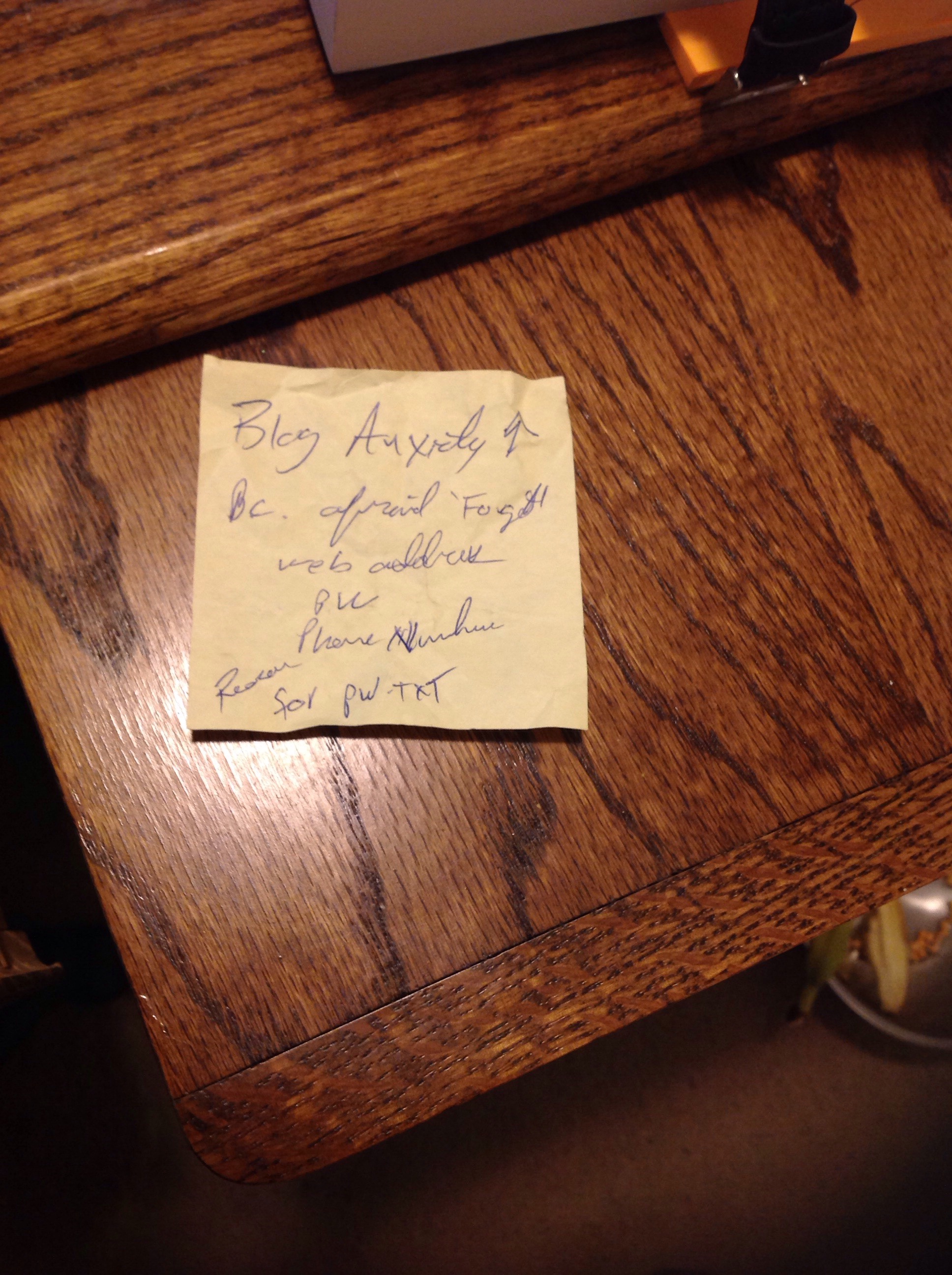
Stay safe
Rodney M Bliss is an author, columnist and IT Consultant. His blog updates every weekday. He lives in Pleasant Grove, UT with his lovely wife, thirteen children and grandchildren.
Follow him on
Twitter (@rodneymbliss)
Facebook (www.facebook.com/rbliss)
LinkedIn (www.LinkedIn.com/in/rbliss)
or email him at rbliss at msn dot com(c) 2021 Rodney M Bliss, all rights reserved
I had the most wonderful interruption to my workday. Actually, it was three interruptions, each just as great as the last one. Only one of them could talk.
One of my grandsons lives with me and my lovely wife. He’s only a couple months old. He doesn’t talk much, although he has no problem communicating. He shares a room with his dad and mom. They, being older, do talk more. My son-in-law is leaving for the service in a few days. My daughter will stay here with us. At least for a while.
The three of them also share a room with the baby’s older sister. My granddaughter is about a year and half old. A little less, but close. She talks more than her younger brother, but not as much as her parents.
It’s been a few years since we regularly had a toddler in our house. We still have the child gate at the top of the stairs, and we still have all the soap, cleaners and otherwise “poisons” in a cupboard out of reach. And all the medicines are under lock and key.
So, my granddaughter mostly has the run of the house. She can’t open doors yet, so she’ pretty much limited to the common areas and any open door that looks inviting. Today, another daughter brought her family which consists of her husband and their 4 month old baby.
So, this afternoon there were two granddaughters and a grandson all interested in distracting me. I eventually, retreated to my office. I typically keep the door locked, but slightly open.
Apparently it’s an inviting door. After a few minutes my door opened a few inches. Not enough to see anything, but enough to know that someone was there. It then pushed open a few more inches and a cherubic face peeked around the corner.
Her speech is limited to “Hello” and “Shoes” so far. But, her eyes were saying, “Papa, are you working?”
No cutie. Right now, I’m not.
Stay safe
Rodney M Bliss is an author, columnist and IT Consultant. His blog updates every weekday. He lives in Pleasant Grove, UT with his lovely wife, thirteen children and grandchildren.
Follow him on
Twitter (@rodneymbliss)
Facebook (www.facebook.com/rbliss)
LinkedIn (www.LinkedIn.com/in/rbliss)
or email him at rbliss at msn dot com(c) 2021 Rodney M Bliss, all rights reserved
I saw a notice of news of the Coronavirus from exactly a year ago. It was the one where the president said there were only 15 cases and they’d all be cleared up soon. I’m not going to speculate on what he knew or didn’t know about the virus on that day in February a year ago. I don’t know. And frankly, I don’t care.
But, we’ve now been through a year of this pandemic. We started off not really understanding how it spread. Could you catch it by touching something? By breathing? We all went out and bought toilet paper and masks. When we could find them. And hand sanitizer, and gloves. And we stayed in our houses. And we worked from home. And we waited.
And then it didn’t get better. It got worse. We saw the numbers of dead grow. First it was only some famous people who were affected. And then we heard about a relative who got it. Or a friend of a friend. Then, it was closer family members and all the while the death toll continued to creep up. It tragically passed milestone after milestone, 50,000, 100,000, 200,000. Finally we passed 500,000 just last week. Then, it was our own family, or maybe ourselves that were infected.
We missed things; birthdays with grandkid, Thanksgiving, Christmas, parties, even dinner with friends. We changed administrations. The players changed, but the game was the same. And the score continued to go up and up with no end in sight.
But, here’s the thing. You’re still here. YOU, the person sitting behind a computer and reading this. Or the person looking at your phone between meetings. YOU have endured. You will endure.
“Shall I tell you what I find beautiful about you? You are at your very best when things are worst.”
– Starman
We are being asked to endure something that no one has experienced in more than 100 years. Many of you lost your jobs. You had to cancel vacations. And yet, you still need to raise your kids. You need to explain to them how to wear a mask. Why to wear a mask. You have to explain why they can’t have a their friends come over to play. You have to explain (again and again) why they have to watch school on the computer instead of being able to attend it in person.
Just know that you are doing great. It doesn’t matter how you compare to the guy next to you, or the woman down the street. You’ve come this far and you will ultimately be successful.
We will tell our grandchildren and great-grandchildren about these days. And they will listen with rapt attention at times having difficulty comprehending what you made it through.
“I couldn’t do that,” they’ll say.
But, you can. You did. And you are.
I’m proud of you.
Stay safe
Rodney M Bliss is an author, columnist and IT Consultant. His blog updates every weekday. He lives in Pleasant Grove, UT with his lovely wife, thirteen children and grandchildren.
Follow him on
Twitter (@rodneymbliss)
Facebook (www.facebook.com/rbliss)
LinkedIn (www.LinkedIn.com/in/rbliss)
or email him at rbliss at msn dot com(c) 2021 Rodney M Bliss, all rights reserved

I’m a good mechanic. I’m not a great mechanic. But, I’m pretty good. And I have a pretty well stocked tool chest. Multiple tool chests, there’s way too many tools for a single chest. Anyway, basically I’m saying I’m reasonable at fixing my car problems.
So, why is the check engine light on my car on? I didn’t check it. I know what it is. Well, I’m pretty sure I know what it is. And I’m not really interested in checking it.
Check engine lights are really stupid and really helpful. They are helpful because there are things that can go wrong inside your car that you don’t notice. You won’t notice until it becomes a serious problem. So, the car manufacturers setup the check engine light. If any one of multiple things go wrong the light comes on. Smart, huh?
Why’s it stupid? Because it’s just one little light. . . for everything. The light might mean your engine is about to blow up, or it might mean that the air to fuel ratio coming out of the catalytic converter is too high. . .or too low.
The check engine light has helped me on multiple occasions. In fact it’s useful enough that I went and bought a code reader. I actually have two code readers.

The red one is specifically for my Suburban. The blue one is generic for any car after 1994.
Code readers are useful because they can do two important things. First, they can read the codes and give you some idea of what’s wrong with your car. And second, more importantly, it can clear the Check engine light so that it doesn’t show on the dash anymore.
So, why am I not pulling out my code reader and checking the code on my Suburban?
Best way to describe it is your car has asthma.
This car had the check engine light on when I bought it from my brother several years ago. When his registration finally expired, I had a problem. You cannot get an emissions test done if your check engine light is on. I could clear the code, but it came back right away. The codes didn’t make a lot of sense to me, so my neighbor offered to get it inspected for me. He “knew a guy” that he thought could fix it.
He had my car for a couple weeks. He spent a lot of time and money with “his guy” working on it. Finally, the code stayed off long enough to get it inspected.
The issue was the air mixture coming out of the exhaust. At times it was too rich. At times it was too lean. It’s not like you can buy a piece to replace the entire air filter systems.
In the summer, the light stayed off for weeks or months at a time. It seemed to be worse in the winter. There didn’t seem to be any rhyme or reason to it. Different types of gas didn’t seem to make a difference. Replacing the air filter didn’t make a difference. I had no idea from one day to the next whether it would be on or off.
And that was the problem. The check engine light can tell you if lots of different things are wrong on your car, on my car. But, my check engine light is now broken. It still works, but because it showed up so many times for that too lean/too rich issue, I don’t check it anymore.
My check engine light has become the boy who cried wolf. It comes on and off multiple times throughout the year. In the meantime I just look at it and ignore it.
Knowing I wanted to write this I did look through and clear the codes. Just like I thought, plenty of too lean/too rich codes. And a few others.
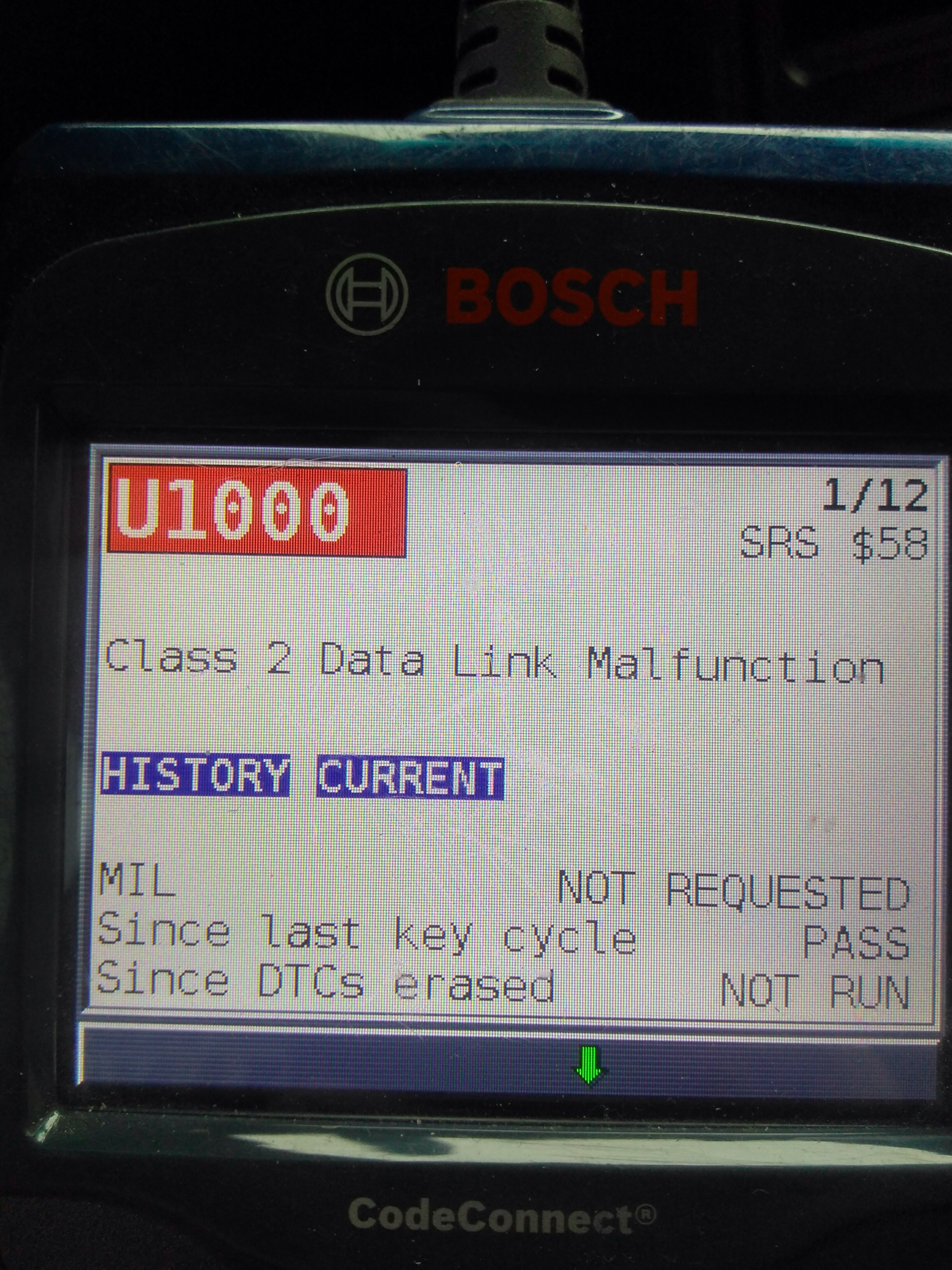

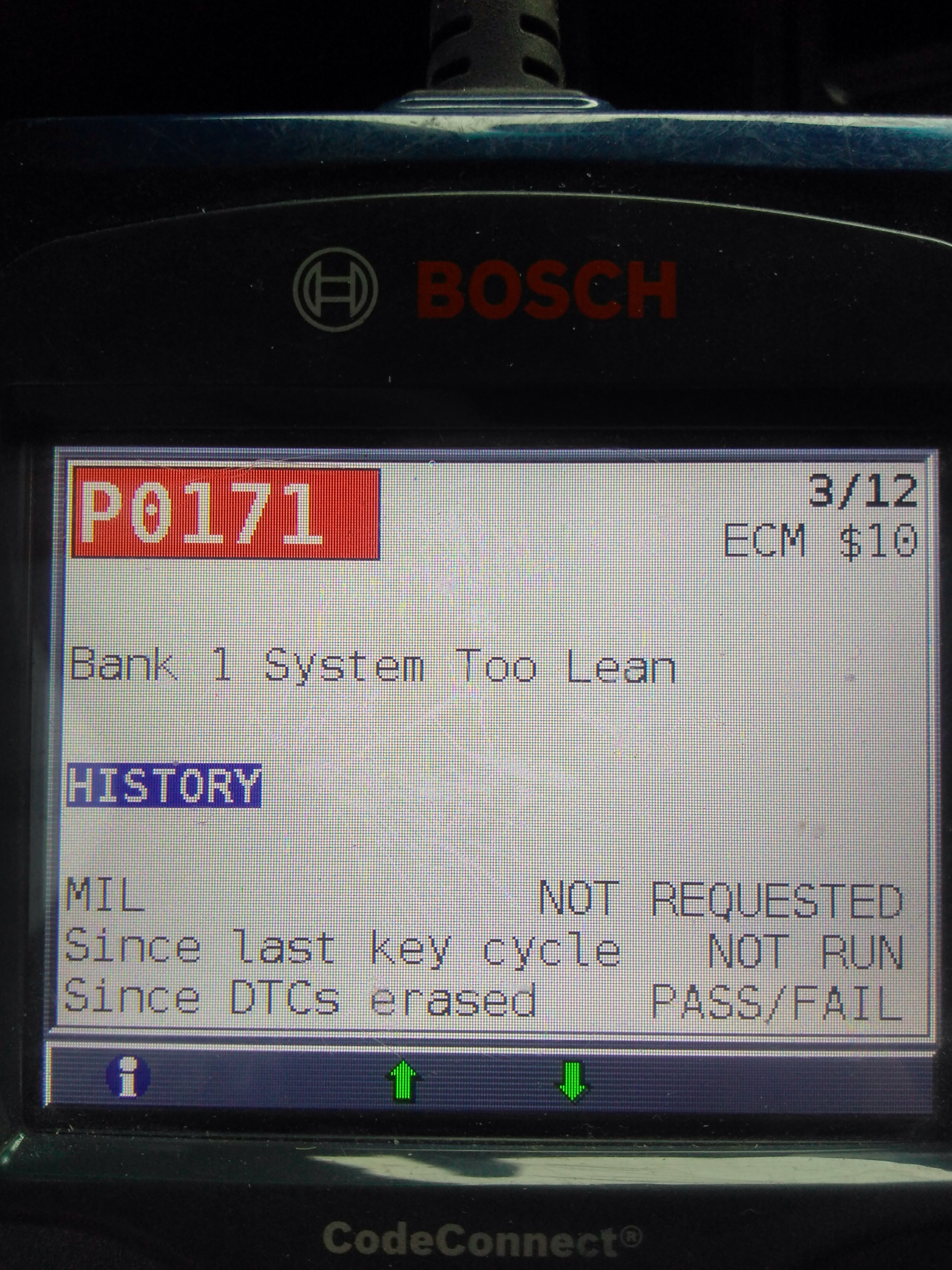
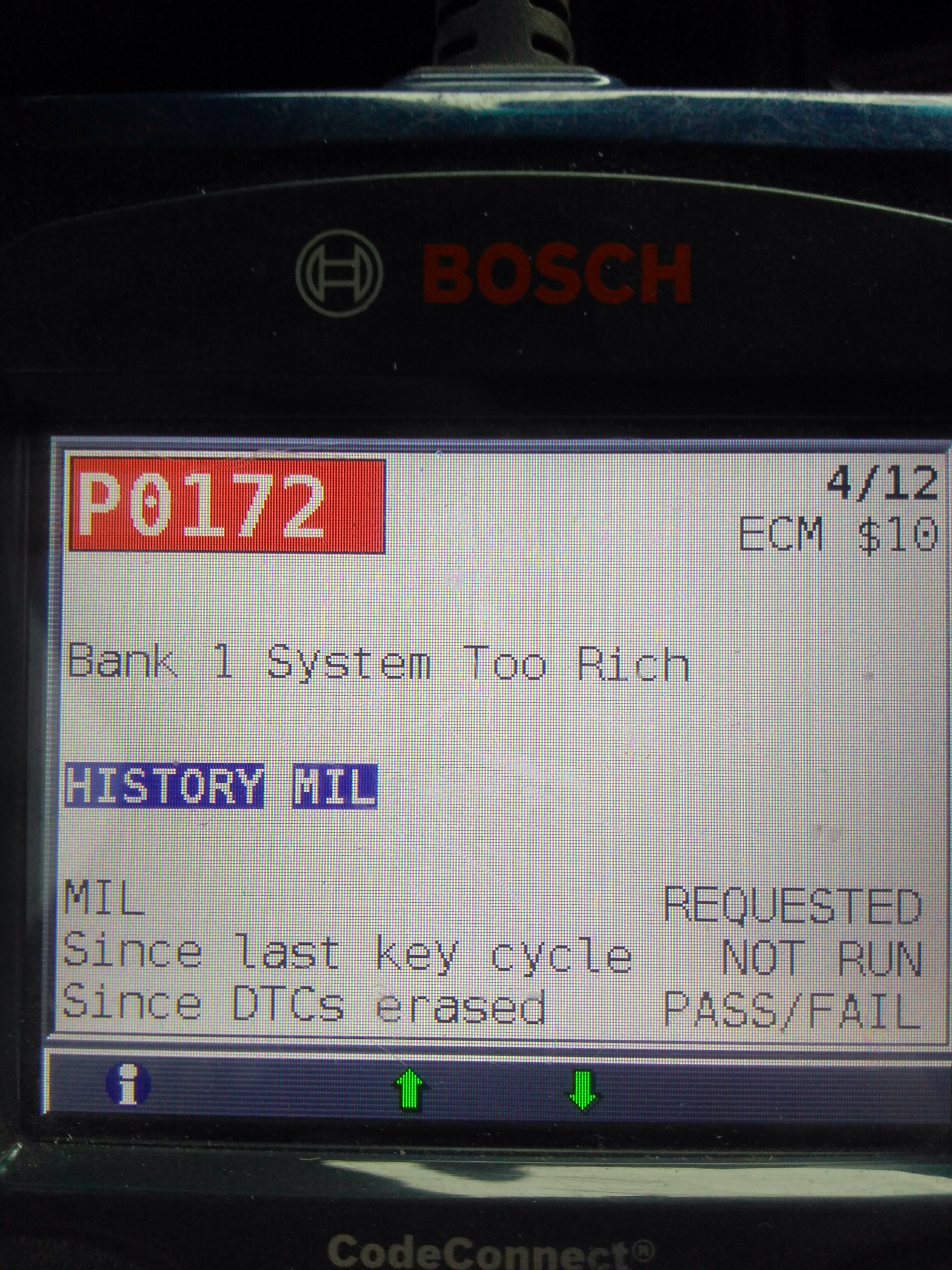

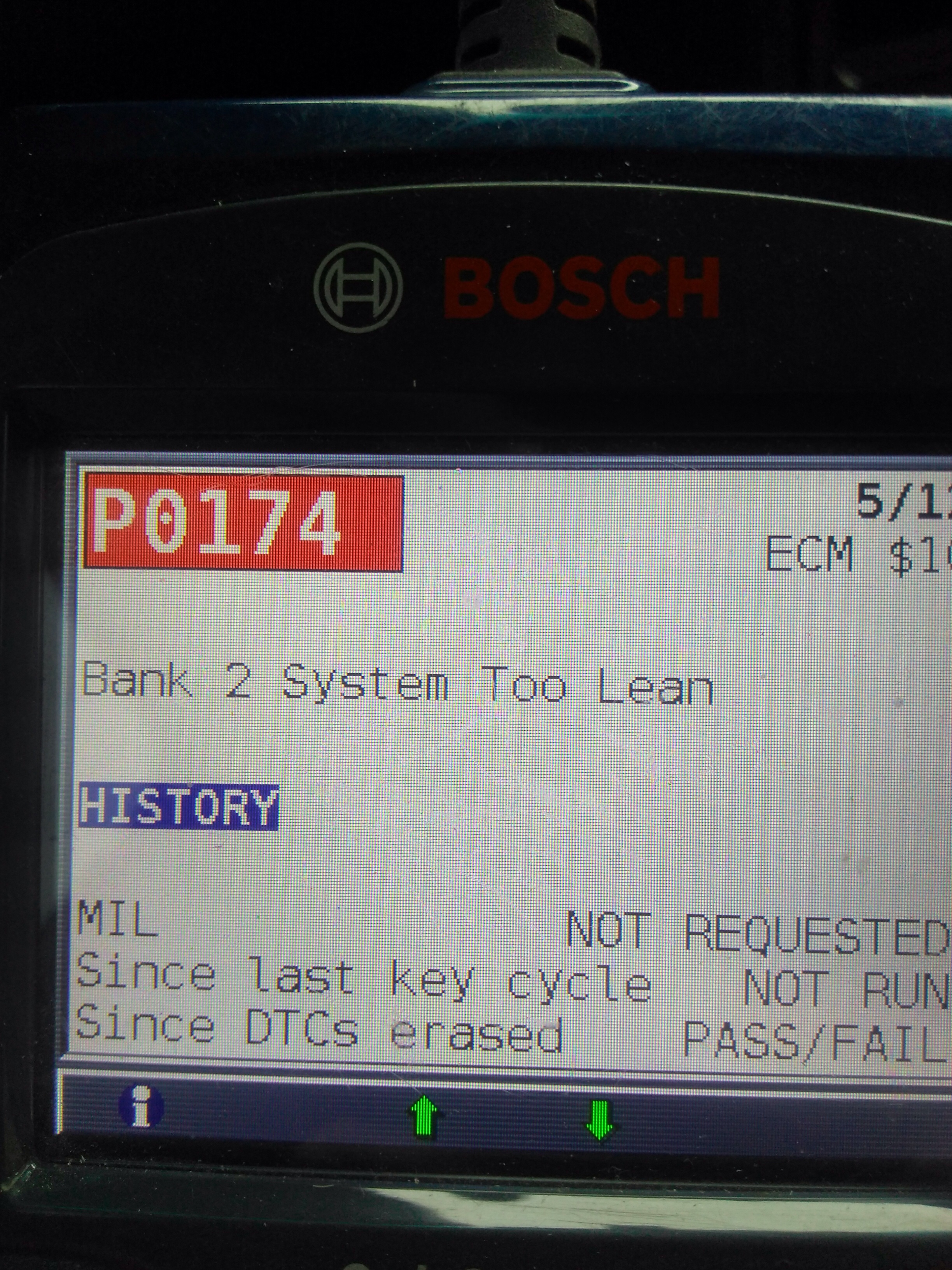



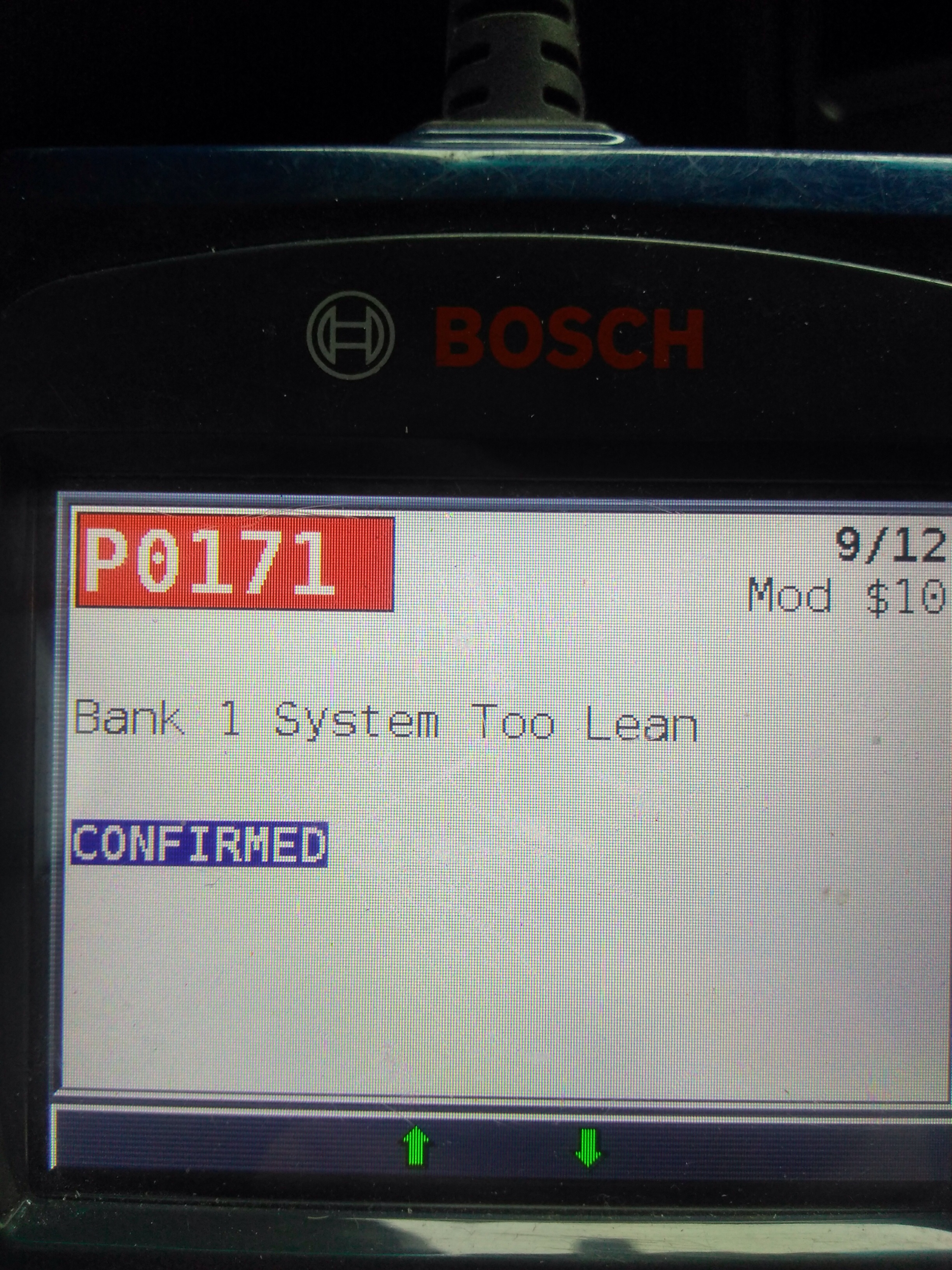


Huh, I wonder what that code is for or how long it’s been on there? I wonder if it will come back?

Stay safe
Rodney M Bliss is an author, columnist and IT Consultant. His blog updates every weekday. He lives in Pleasant Grove, UT with his lovely wife, thirteen children and grandchildren.
Follow him on
Twitter (@rodneymbliss)
Facebook (www.facebook.com/rbliss)
LinkedIn (www.LinkedIn.com/in/rbliss)
or email him at rbliss at msn dot com(c) 2021 Rodney M Bliss, all rights reserved
Scott Adams published this script in 2018. It came up a couple days ago on my desk calendar.
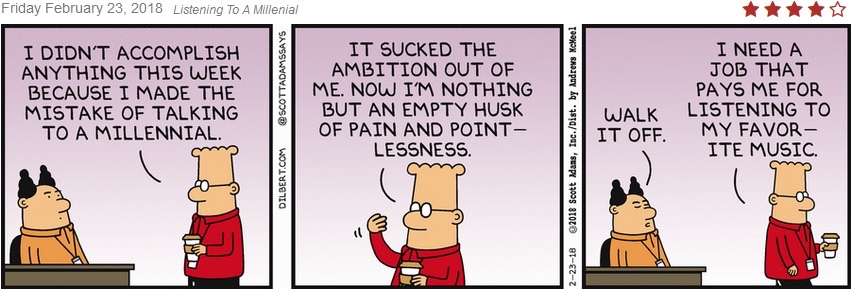
When Adams wrote this strip he had no way of knowing about COVID. We weren’t even contemplating a worldwide work from home plan. My office is small. It’s about 4 feet wide by 7 feet long. (Yes, it is THAT small.) But, it’s in the basement and it has a door. When I sit down and shut the door, I’m in my own little world.
On my desk is an iPad, a cell phone, a VoIP Internet phone, a laptop in a docking station, a 23″ monitor and two 25″ monitors. And I have two small, but powerful stereo speakers. They are connected to my iPad and it’s 1500 song music library via Bluetooth.
If I set the speakers at the correct volume, you cannot hear them bleed over into my Zoom calls through my headset. I typically turn on the music in the morning and let it play all day. Sometimes I’ll pick an artist, Elton John, or The Beatles, or Miranda Lambert, or any of a hundred others. Other times, I’ll let the iPad randomly pick music. I might hear Miles Davis followed by Toby Keith. Doesn’t matter, I like them both.
And that’s what I realized on Monday when I was reading this cartoon. Dilbert complains about his job and thinks it would be better if he had a job that paid him to listen to his favorite music.
It’s three years later. Dilbert? Welcome to the future.
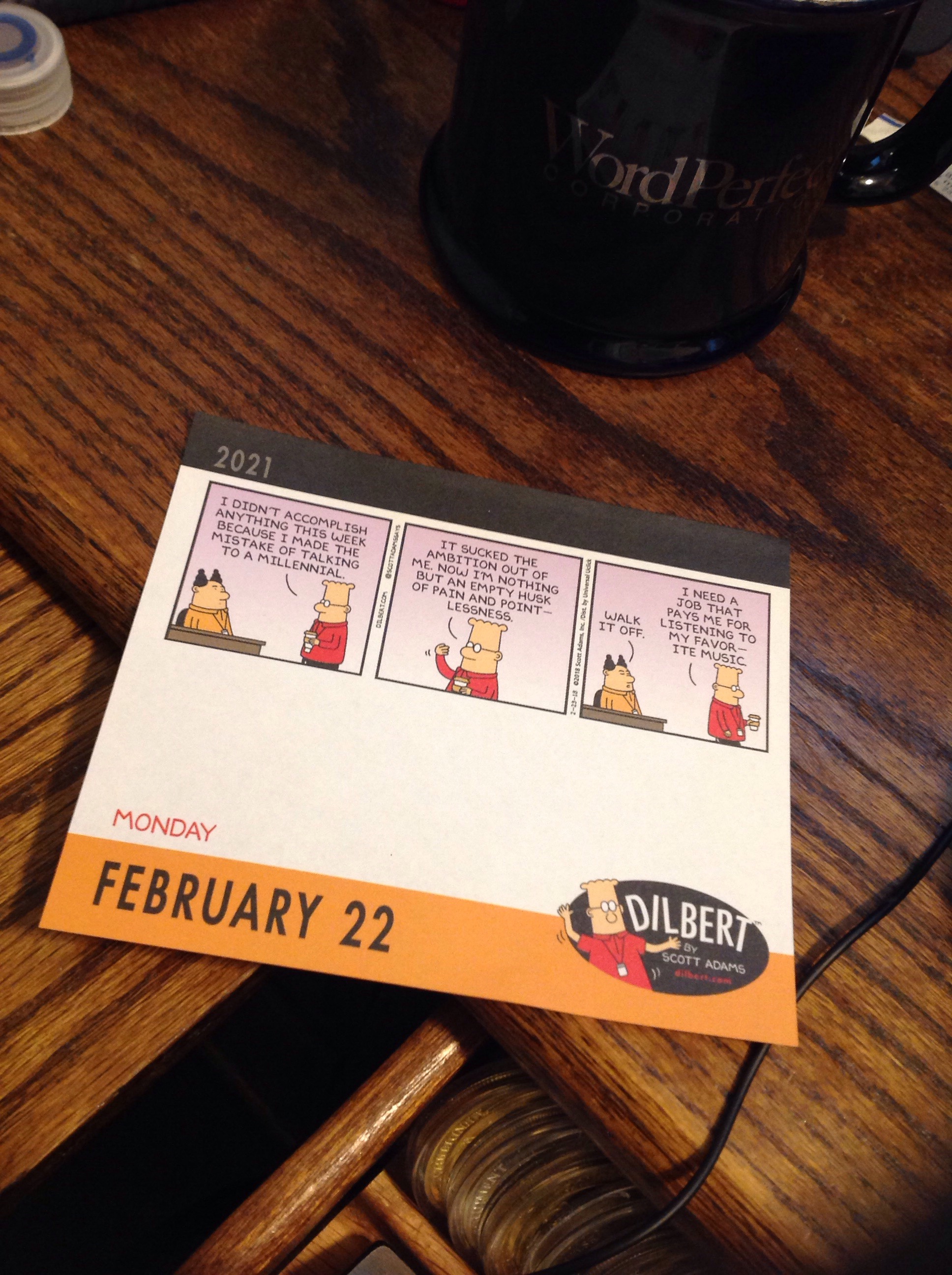
Stay safe
Rodney M Bliss is an author, columnist and IT Consultant. His blog updates every weekday. He lives in Pleasant Grove, UT with his lovely wife, thirteen children and grandchildren.
Follow him on
Twitter (@rodneymbliss)
Facebook (www.facebook.com/rbliss)
LinkedIn (www.LinkedIn.com/in/rbliss)
or email him at rbliss at msn dot com(c) 2021 Rodney M Bliss, all rights reserved
I have an unusual last name. And fortunately, it’s a name that inspires positive thoughts for people.
BLISS: perfect happiness; great joy
Sometimes people compelled to comment on it.
That’s a wonderful name.
Thanks, I picked it out myself.
And I did.
There is a Greek tradition of not naming children until sometime between the 7th and 10th day after their birth. In Kenya, it’s a tradition that a baby’s first name called the jina la utotoni, is given to them by an older relative. Up to 40 days after birth the child is given its adult name, called the jina la ukubwani by the parents or grandparents.
I had a relative named like this, or nearly so. When my niece was born, her parents couldn’t decide on a name. So, she had no name for the first part of her life including a family reunion where I met her for the first time. We took to calling her Baby No-name during the reunion.
Eventually, the name was decided because my brother-in-law performed a the religious rite of giving the baby a name and a blessing. The name he gave her in front of God and the church? Yeah, the one he’d picked.
Fortunately it suits her.
I have eight daughters. My lovely wife wouldn’t let me name a single one of the “Joy Ann.” I had them convinced each one of them that it was going to be their name, until they finally saw through my jokes at about 8 years old.
You might think that no one would consider naming their child “Joy An[d] Bliss.” But, I had a friend in school named Joseph. His last name was Kerr. He went by the name Joe. Yup. I went to school with Joe Kerr. He got kidded about it, but I’ wouldn’t be surprised if he named his first son Joseph. After all, his full name was Joseph Kerr III. The same joke didn’t get old for three generations.
One of my daughters married a man last named Swain. Their first born son was the first grandson for my lovely wife and me. My daughter called one day to tell me they had chosen a name.
We’ve decided to name him Bruce.
Bruce Swain. Have you thought about this?
Absolutely. We think it will be a fun and unique name.
It’s easy to imagine years of themed birthday parties for him.
Names are funny things. We spent hours considering the names for our 13 children. Even the adopted ones got new names.
And that’s what happened to me. I was adopted when I was 16. I wasn’t some foster care kid finally getting a forever home. My mother, my birth-mother, married a man when I was 11 year old. When I was 16 I asked him to adopt me. My older brother did as well.
Yes, I like the name Bliss. I picked it out myself.
Stay safe
Rodney M Bliss is an author, columnist and IT Consultant. His blog updates every weekday. He lives in Pleasant Grove, UT with his lovely wife, thirteen children and grandchildren.
Follow him on
Twitter (@rodneymbliss)
Facebook (www.facebook.com/rbliss)
LinkedIn (www.LinkedIn.com/in/rbliss)
or email him at rbliss at msn dot com(c) 2021 Rodney M Bliss, all rights reserved
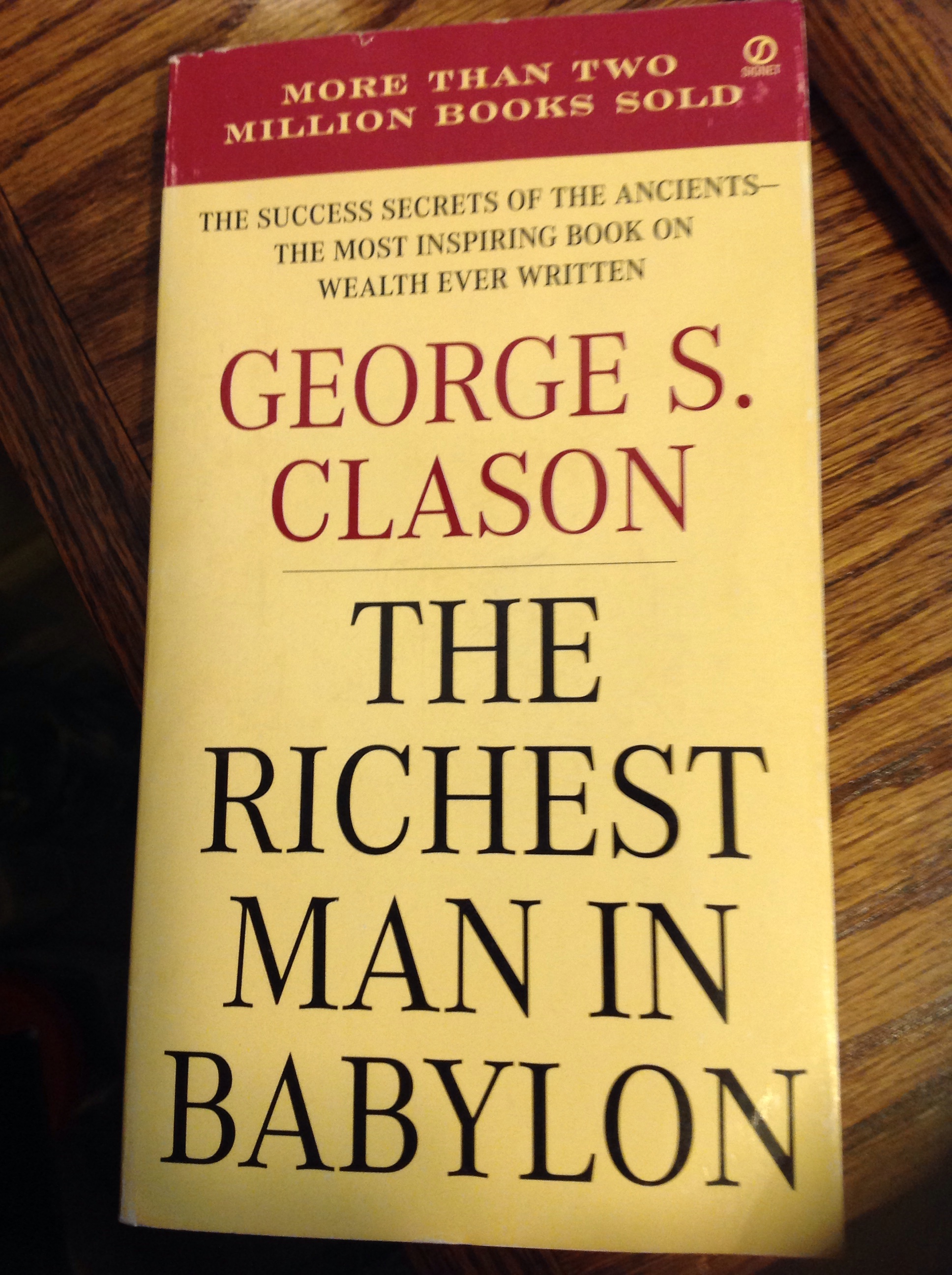
Any book that has been in print for 100 years probably has something interesting to say. “The Richest Man In Babylon” by George S. Clason was first published in 1926. It’s not quite 100 years old, but I’m going to assume it will still be in print five years from now, so we’ll call it close enough.
This book is a business book masquerading as a novel. It’s set in ancient Babylon. But, it’s really about a few simple business rules.
Cures to A Lean Purse
– Start thy purse to fattening
– Control thy expenditures
– Make thy gold multiply
– Guard they treasures from loss
– Make of thy dwelling a profitable investment
– Insure a future income
– Increase thy ability to earnMen of action are favored by the Goddess of Good Luck
Five laws of Gold
– Save 10% of what you earn
– Invest your money and make it grow
– Get good advice on your investments
– Don’t invest in stuff you don’t understand
– Don’t chase “impossible” gains
These lessons are woven throughout the book and told at least twice, or more in slightly different scenes. You meet various characters, who’s names are not really important other than to hold the sotry together. The book really does introduce you to the richest man in Babylon. I have no idea if there is any historical reference or not.
The writing is clear and the stories move fairly well with the occasional lapse into monologuing.
What I Liked
This book was a gift from my son and I was predisposed to like it. And I wasn’t disappointed. But, I was also not overly impressed. The financial lessons are valid and transdential. At least in terms of time. Absolutely the lessons are valid today as much as they were 100 years ago, and I would expect 6,000 years ago in ancient Babylon.
Clason didn’t beat the reader over the head, even though he teaches the same lesson multiple times.
What I Didn’t
Clason worked hard to create an interesting story to go along with his financial advice. However, the story, as stories go was pretty flat. We don’t really care about these characters. The son who wastes his inheritance? Meh. He’s going to suffer. And then he does.
Also, there is a chapter that is set in 1934. We are introduced to a professor of archealogy at Nottingham University. The professor translates some Babylonian tablets with some of the above rules on them.
I spent way too long trying to figure out how Clason, writing in 1926 could include a scene from 1934. Did he speculate? Was it added in a later edition?
It’s not a good sign when the reader spends more time thinking about how you wrote the book than what’s in the book.
What It Means To You
If you follow the lessons in “The Richest Man In Babylon” you will improve your finances. If you really adopt it, the lessons will help you get out of debt and eventually build real wealth. And you will no doubt, be happier for the change.
Just don’t expect the accompanying story to do much more than provide a simple vehicle for delivering the message.
My Rating
2.5 out of 4 stars (3 for the financial lessons, 2 for the accompanying storytelling)
Stay safe
Rodney M Bliss is an author, columnist and IT Consultant. His blog updates every weekday. He lives in Pleasant Grove, UT with his lovely wife, thirteen children and grandchildren.
Follow him on
Twitter (@rodneymbliss)
Facebook (www.facebook.com/rbliss)
LinkedIn (www.LinkedIn.com/in/rbliss)
or email him at rbliss at msn dot com(c) 2021 Rodney M Bliss, all rights reserved
